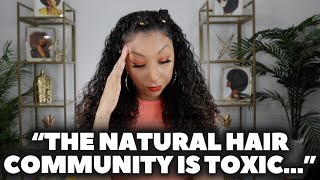I Wish There Were Challenges in The Natural Hair Community that Gave Us Answers To Some Of My Scient

Have you noticed a trend lately on social media with all the crazy challenges? I mean seriously, how can people be that starved for attention? Fire challenge, really? I am most peeved about the fact that it’s mostly the black community participating in these hare-brained things. How about we participate in a challenge that actually is worthwhile? You know, like one that won’t disfigure us, or cause serious medical damage?
We in the hair community are still figuring things out about the proper care and maintenance of our hair. The information out there is more than it was a decade ago, but even so, credible information is still sparse. For the most part, we have been dependent on European studies to tell us something about our hair. It’s said that if you want something done properly, you must do it yourself.
So how about we start having challenges that offer some information on our hair? I know we’ve seen and participated in many thirty day challenges, but how many of them have been truly experimental to the point where it resulted in some hard scientific evidence that could be used to further explain aspects of our hair’s behavior?
Now I am not usually one to just go off my opinions as the basis for an article, though there is a segment for it on the site. I tend to like to write about things that can be substantiated by some semblance of concrete evidence.
However, I’ve been mulling over a few questions in my mind for the past few months, and I’ve been diligently searching for answers to some questions I have about issues related to postpartum shedding.
For those who might not have a clue as to what postpartum shedding is, it is a hair loss condition that happens as a result of having a baby. What we know is that for women who experience this, the hormone levels in the body after pregnancy drastically plummet, causing extensive shedding that is quite noticeable.
Based on what I’ve read, I have come up with a few theories that I want to share today to open up a discussion, because truth be told, this site is about learning about our hair, and discussions can go a far way with that.
Even better, if I can incite some ideas so that those in academia among us with the means to do research can do a study to put the matters to rest, it would be worth it to stick my neck out.
So as stated before, I’ve been thinking about this postpartum shedding thing, and I have come up with my own theories. Since every woman’s body is different, the reactions to pregnancy hormones will be different.
 Your diet, along with supplements*, can contribute quite a bit to the level of hormones, and around this time they tend to sky rocket in a bid to support you, and the life you are nurturing on the inside. However, I’ve been thinking that if your diet is such that it provides all the nutrients needed to support you and to make the food your baby needs, then you won’t have need to supplement with prenatal vitamins.
Your diet, along with supplements*, can contribute quite a bit to the level of hormones, and around this time they tend to sky rocket in a bid to support you, and the life you are nurturing on the inside. However, I’ve been thinking that if your diet is such that it provides all the nutrients needed to support you and to make the food your baby needs, then you won’t have need to supplement with prenatal vitamins.
Since it has been shown that a flood of vitamins in high concentration can cause hair to shed prematurely in some cases, it stands to reason that this can be avoided through proper nutrition. Some obstetricians will tell you that prenatal vitamins are not important, once your nutrition is on point.
Here’s another theory: if you experience normal shedding during pregnancy, then you will have minimal to no postpartum shedding.
It is a fact that not all women experience postpartum shedding. Research also shows that postpartum shedding is a result of most of the hair follicles coming out of the resting phase during pregnancy, and then going to the shedding stage, before returning to the resting phase, after the birth of a child.
Since women who eventually experience postpartum shedding usually have very little to no shedding during pregnancy, could it be that normal shedding during pregnancy will mitigate the effects of postpartum shedding? I’m thinking that if the telogen phase is not delayed during pregnancy, normal shedding would mean that the hair growth stage will continue as normal, and there won’t be a wholesale shedding that creates noticeable bald spots after pregnancy.
Finally, can it be said that the hair growth cycle resets for women who experience postpartum shedding? The stages of the hair growth cycle include the anagen, catagen and telogen stages. For women who do not experience postpartum hair loss, there seems to be very little to no disruption in the cycle.
The anagen and catagen stages seem to be affected during pregnancy for most women, in that hair seems to grow thicker and longer as more follicles come out of the resting stage. Women who do not lose the hair after pregnancy benefit greatly from this. However, for those who experience postpartum shedding, hair falls out at an alarming rate. Would this be an indication that for these women, there is so much disruption that the entire growth cycle goes into reset mode? If such is the cause, could this reset, then change our terminal length in any way?
Maybe some of you have wondered the same thing. Perhaps it never crossed your mind. Whatever the case, I’d like someone with a knack for science to shed light on these things. Get some studies going. Rubbish these theories, or give us something to substantiate them. At the end of the day, whichever way the cookie crumbles, the healthy hair community will be better for it. Here’s what I would like you to do:
►If you are expecting, monitor your growth and shedding rate during pregnancy, and compare it to the rates post pregnancy.
►If you are among those – like me – who have decided to forego supplementing with commercial pre-natal vitamins, assess your growth and shedding rate during and after pregnancy, and come back and tell us what you observed.
With a little innovation, we may just be able to learn something more about postpartum shedding from our own little experiment. So, are any of these theories plausible? Which would you most like the answer to?




